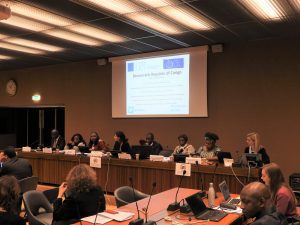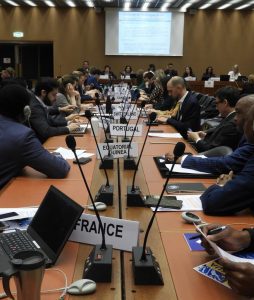April 29, 2019
Survivors’ Voices at the Universal Periodical Review of Congo, Geneva, April 2019
At the beginning of April 2019, the Mukwege Foundation was in Geneva with Tatiana Mukanire, Coordinator of the Movement of survivors of rape and sexual violence in DRC, to participate in the pre-session of the Universal Periodical Review (UPR) of the Democratic Republic of Congo, with the support of the Lutheran World Federation.
This pre-session takes place ahead of the international human rights assessment that each UN Member State undergoes every four and a half years: the UPR is a universal, peer-review mechanism boasting the voluntary engagement of all 193 Member States since its inception in 2008. In May 2019, DRC (as well as 12 other countries) will be examined by its peers, and the April pre-sessions organised by UPR Info are a great opportunity for advocates to present their recommendations and call on like-minded states to include these demands into their own recommendations for their country in May.
After a one-day training about UPR and advocacy, Tatiana spoke during the pre-session dedicated to DRC on Tuesday 2nd April, together with DRC representatives of the National Human Rights Commission, the CSO coalition working on rights of vulnerable people (addressing the human rights of LGBTI persons, persons with disabilities, Pygmies), REGER (the CSO coalition working on rights of children, with a specific focus on street children, right to free education, right to health), the CSO coalition working on rights of women (with a focus on political participation), and SOS-IGM (an NGO working on torture).

Tatiana Mukanire did a presentation on the issue of sexual violence in conflict, focusing on 3 aspects from the joint report submitted to the UPR process by the Mukwege Foundation, the DRC survivor movement, the Panzi Foundation and the Right Livelihood Award Foundation (all submissions can be found here: our joint report is the NGO joint submission JS 20). She made recommendations about rape as a weapon of war; access to reparations; prevention of sexual violence.
« Il est temps que la survivant.e des viols et violences sexuelles montre à la face du monde qu’elle vaut plus que la stigmatisation de la société. C’était pour moi un grand honneur de porter la voix des survivant.es de la RDC à l’ONU, cette voix longtemps ignorée. Nous avons depuis longtemps été des oubliées de notre société meurtrie. Le fait que le monde commence à nous donner de la place apporte un peu plus d’espoir aux victimes et survivant.es des viols et violences sexuelles. »
“It is time that survivors of rape and sexual violence show to the world that they are worth respect and not stigma. It was a great honour for me to bring the voices of survivors of DRC to the United Nations for the Universal Periodical Review of DRC. Our voices have long been ignored; we have been forgotten by our bruised society. Getting support and a space to speak brings hope to all survivors of rape and sexual violence.”
UPR Info summarises the April pre-sessions with an article on their website, and highlighted the impact of the presence of Tatiana: “Violence against women was discussed in all but two of the panels, with a survivor of sexual violence taking the floor during the Pre-session on the DRC to present the human rights situation in the Eastern region of the country”.
In a document compiling all the submissions of civil society for DRC (document submitted to the Human Rights Council for the May UPR session), the Office of the United Nations High Commissioner for Human Rights (OHCHR) included some analysis from our joint report:
“Joint Submission 20 (JS20) noted with great concern that rape and sexual violence continued to be widespread in the Democratic Republic of the Congo, particularly in the provinces of North and South Kivu, Tanganyika, Ituri and Kasaï. Abuses were committed by all parties to the conflict: Government forces, militias, armed groups and a growing number of civilians in connection with the conflict. Despite the statistics presented by the Government, JS20 found no decrease in sexual violence. The Panzi Hospital in Bukavu treated between 1,300 and 1,900 women per year, a figure that had not decreased in recent years. Indeed, since 2016, the hospital had noted an increase in the number of victims of sexual violence.
Joint Submission 20 (JS20) stressed that, since the adoption of two new laws on sexual violence (006/018 and 006/019) in 2006, its legal arsenal against crimes of sexual violence met the standards of international law. JS20 reported, however, that implementation remained problematic and demonstrated a lack of will on the part of the authorities to seriously address the violence.”
Together with Apolline Pierson (Project Manager for the Mukwege Foundation) and Saname Oftadeh (Programme Advisor for the Lutheran World Federation), Tatiana also met several permanent missions to the United Nations in Geneva: Norway, France, Belgium, Côte d’Ivoire and Sweden. Important issues were discussed: impunity, access to reparations, prevention of sexual violence, holistic care, positive masculinities. They also met with WILPF (the Women’s International League for Peace and Freedom), who have a national member in DRC.
These 3 days in Geneva were therefore very successful and we look forward to seeing strong recommendations issued by States towards DRC on the 7th of May so that justice and women’s human rights are realised, and survivors see their voice lead to concrete action.

















